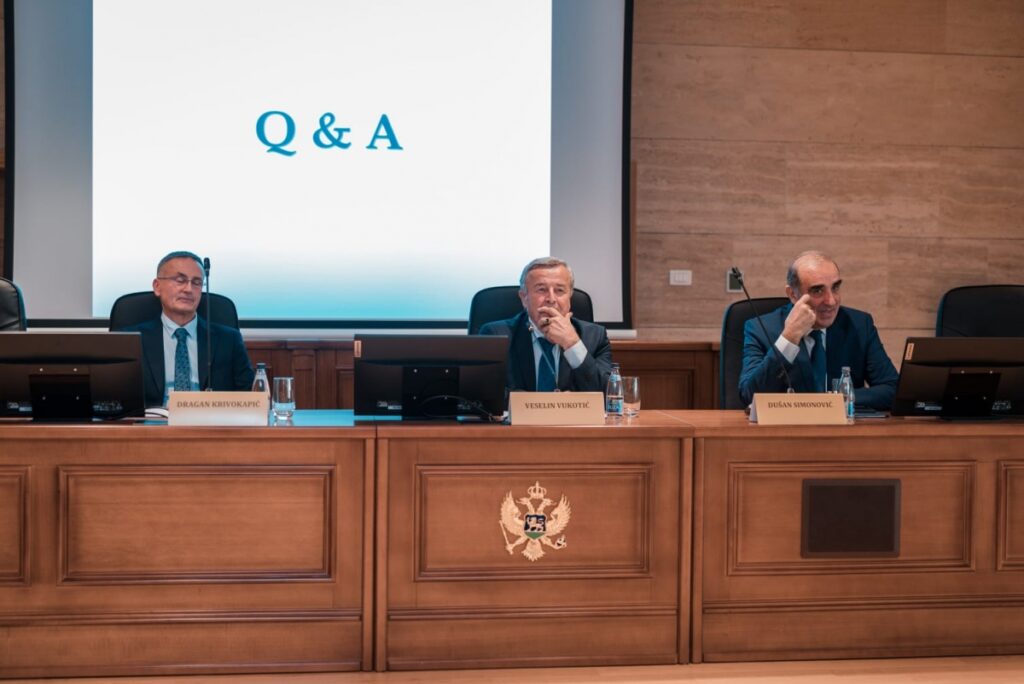The first day of the “Olympism in Montenegro” conference, which was organized by the Montenegrin Olympic Committee (COK) in cooperation with the Montenegrin Academy of Sciences and Arts (CANU), began with a series of introductory speeches by the president of the Montenegrin Olympic Committee, Dušan Simonović, academician Veselin Vukotić and prof. Dr. Dragan Krivokapić.
“Olympism is not just a set of rules or ceremonies that follow sports competitions, but a philosophy of life that combines sports with culture and education, striving to achieve harmony between body, will and mind,” said the COK president.
At the international conference “Olympism in Montenegro”, he pointed out that the importance of Olympism goes beyond sports arenas, stating that through Olympic values, respect, friendship, tolerance and equality are taught.
“These are values that we must pass on to young generations, because they represent the basis for building a healthy and just society. By promoting the principles of universal equality, respect and solidarity, Olympism encourages peace, friendship and mutual understanding between peoples. These ideals form the basis of our work,” Simonović said.
He emphasized that he is glad that the conference is being organized in cooperation with the Montenegrin Academy of Sciences and Arts, stating that it reflects a common commitment to improving the values and principles of the Olympic movement in our country.
Simonović reminded that in 2007, the COK officially became a member of the international Olympic family and that this made it possible for Montenegrin athletes to appear independently for the first time at the Olympic Games in Beijing in 2008.
“That performance is a historic moment for Montenegrin sports and an important step for our nation, from which we successfully and dedicatedly build the foundations for future generations of athletes and strengthen Olympic values in Montenegro,” said Simonović.
According to him, from then until today, COK has developed into an organization that not only supports athletes in achieving top results, but also continuously works to promote the basic values of Olympism in Montenegro.
Simonović emphasized that the mission of COK is not only the organization of participation in the Olympic Games, but also continuous work on creating a sustainable and efficient system for the development of Montenegrin sports.
“I invite you to accept together the philosophy of Olympism as a way to build a better world through sport, where we compete but also cooperate, where we strive for excellence, but also understand the value of learning from defeat, where we value sportsmanship and chivalrous combat, but above all we respect each other,” concluded Simonović.
Academician Veselin Vukotić, speaking about the philosophy of sport and Olympism, emphasized the importance of the connection between mind and body. He emphasized that the body is the supreme mind, as claimed by the philosopher Nietzsche, and that this message should be conveyed to the education system, which often separates physical from mental development. Vukotić pointed out that the Olympic Games are essential promoters of the idea that ideas, not interests, rule the world, and that many world problems would disappear if the world were guided by Olympic principles.
He emphasized that philosophy, as a way of understanding reality, offers answers to the most sublime questions. Without philosophy, he believes, we would not be able to understand the essence of life and human being. Olympism is not an institutional system, but a moral obligation of each individual, which symbolizes the unity and togetherness of all nations, as the ancient Olympic Games did for the ancient Greeks.
Dragan Krivokapić, a professor at the Nikšić Faculty of Sports and Physical Education, spoke about the development of sports in Montenegro at the end of the 19th century, when Montenegrin athletes practiced traditional skills such as shoulder throwing and wrestling. Diplomacy and the arrival of foreign diplomats in Montenegro contributed to the introduction of new, modern sports such as tennis and golf, which quickly became popular in the capital.
Krivokapić pointed out that Montenegro experienced significant cultural development thanks to diplomatic cooperation, which led to the establishment of sports clubs and societies. The establishment of the first golf club in the Balkans in Cetinje in 1906 is particularly significant, as well as the development of tennis and football, the beginnings of which laid the foundations for the further development of sports in Montenegro.
After the introductory presentations, the conference continued with a series of panels. The first panel, titled “Contemporary Society and Olympism”, was led by Assoc. Dr. Marija Orlandić, who, together with prominent experts, such as Dr. Tania Braga, from the International Olympic Committee, and Assoc. Dr. Vojin Golubović and Prof. Dr. Nenada Vujadinović discussed the social, economic, cultural and artistic aspects of Olympism. The discussion explored the broader social impact of the Olympic movement and its potential as a tool for identity revival in Montenegro and beyond.The second panel, “Organization and legal aspects of Olympism”, focused on the organizational structure of the Olympic Games and the legal framework of the Montenegrin Olympic Committee. Moderated by Miljana Rakočević, this panel brought together experts who discussed key issues related to the management and control of funding within the Olympic movement. Dr. Ivan Jovetić and prof. spoke on the panel. Dr. Branislav Radulović.
The third and last panel of the day, “Montenegro sports and athletes at the Olympic Games”, was dedicated to the achievements of the best Montenegrin athletes. Maja Peković, Katarina Bulatović, Dragan Adžića, Srđan Mrvaljević and Milivoj Dukić spoke on the panel, moderated by Dr. Marija Radunović, who shared their personal experiences and insights regarding preparations and competitions at the highest level of international sports.
The conference continues tomorrow with panels that will focus on the role of Olympism in education.
